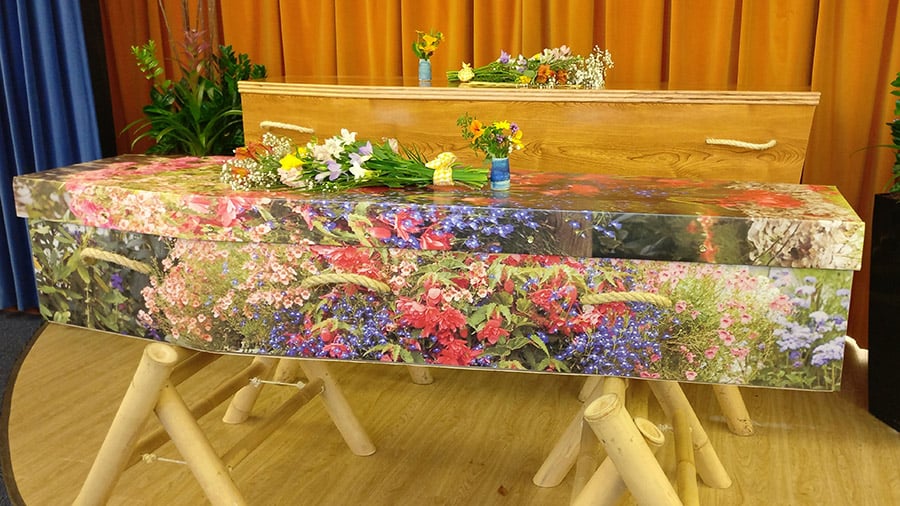
This is a photo I took of my parents’ joint funeral.

Unbelievably, they both died in the same week, in their sleep, aged 86 and 84. My dad had had a stroke a year previously and hadn’t been doing too well, so it wasn’t entirely unexpected when I got a phone call one morning saying he hadn’t woken up.
But it was a shock to experience Mum also dying in her sleep just a week later. They had been together 67 years but even so, no-one expected this, even though she’d had motor neuron disease.
Once my siblings and I got over the shock, we felt glad that our parents were ‘still together’ (at least in our belief system), and that Mum had not had to suffer from MND any longer than she had already been.
It became obvious that we would be having a joint funeral, if possible.
Fortunately, both of them had prepared well the previous year. But they hadn’t just done the obvious, like a will, power of attorney, and advance healthcare decision. They had made a comprehensive end-of-life plan.
This consisted of filling out the Before I Go Workbook, a comprehensive document about their financial affairs, how their household operated, what they wanted in their last days/weeks, their digital life, details on the kind of funeral they wanted, including songs, people to invite (or not), the location of the after-funeral gathering, and a long list of other things.
They had also begun to death clean, that is, to declutter towards the end of life.
All we had to do was carry out their wishes. And because my siblings and I had been involved beforehand, it was relatively easy.
I can’t describe how wonderful it was to know that they had known we would do this exactly as they wanted – it was a source of huge comfort and solace. Carrying out their instructions felt like a great honour; a last gift I could give them.
But sadly, most people face death unprepared. They think that having a will or knowing if they want a burial or cremation is enough.
Of course, even those little details amount to more than nothing, but there are lots of other things you can do to save your family/friends stress, worry, expense, and time after you have gone. If you don’t plan for death, you are actively choosing to likely leave your family with a muddle.
So, what can you do to prepare?
Accept There Is More to You Than a Body
If you have been around any dead bodies, you’re bound to notice they are like an empty shell. The person just isn’t in there anymore.
So, when someone dies, think about who or what they were like in the first place. Contemplation of this idea for others, and then eventually for yourself, will make it much easier to consider the practical fact of death.
Start the Conversation with Your Loved Ones
Find out, in a general way, what your family and/or friends think about death (and life). Use a celebrity death as a starting point – for instance, when Aretha Franklin died, she left no will.
It would be entirely natural around that time to ask whether your friend or family member has a will or not, and that can lead into other general concepts about end-of-life matters.
Stop Behaving as If You’ll Live Forever and Start Living Now
One of the top regrets of the dying is not having spent enough time with family and friends. If that’s you, then accepting the fact that you are going to die will automatically propel you into thinking about what is important to you right now.
When my husband died in 2011, I became passionate about only doing things that I enjoyed. I had realized that I, too, could die at any moment, and the thought of that happening when I was in the middle of not enjoying myself was too much to bear.
So, I made all sorts of changes, and still live my life like that.
It’s always a good idea to join a group of people committed to support each other in planning their end-of-life journey. You can hold each other accountable for the tasks that need to be done, get good cheer when you need it, give and receive sympathy and encouragement to keep moving forward, step by step.
You can do this with family members or friends. Or take the Before I Go Method online course, which I developed after my husband died.
Let’s Have a Conversation:
What is one small step you could take right now to start preparing practically for when you are no longer here, and thus giving your family/friends an unusual gift? Please jot it down in the comments below.





